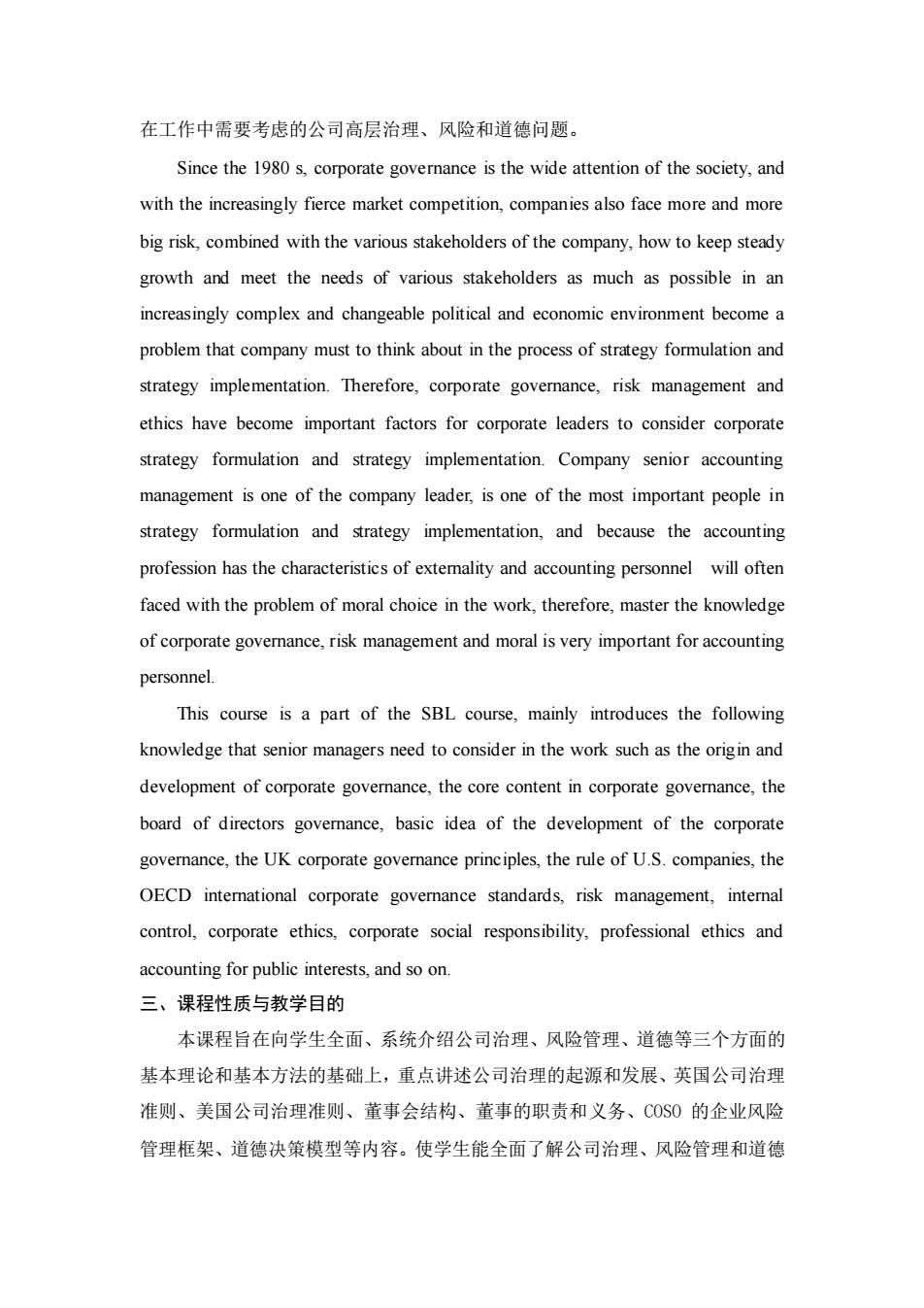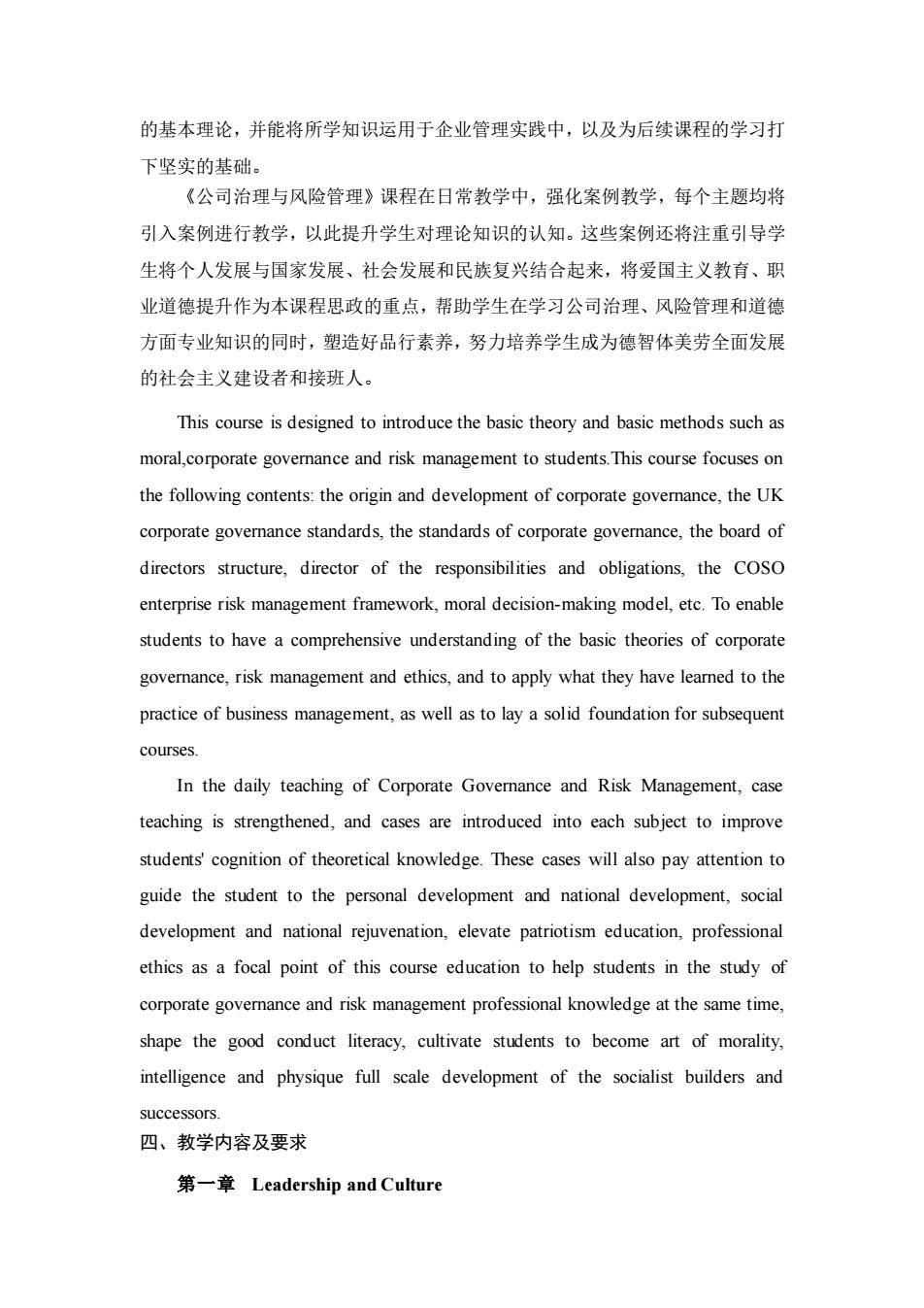
《公司治理与风险管理(SBL1)》课程教学大纲 一、课程基本信息 课程代码:18020143 课程名称:公司治理与风险管理(SBL1) 英文名称:SBLI(governance,risk and ethics)) 课程类别:专业课 学时:总课时48 学分:3学分 适用对象:ACCA专业的本科生 考核方式:考查:本课程的成绩考核包括期末课程论文与平时成绩。平时成 绩包括考勤、课堂表现和平时作业。 先修课程:F1,F2,3,F4,F5,F6,F7,F8,F9 二、课程简介 20世纪80年代以后,公司治理受到社会的广泛关注,并且随着市场竞争日 益激烈,公司面临的风险也越来越大,加之各种利益关系者对公司权力的角逐 怎样在日益复杂多变的政治经济环境中保持持续稳定的增长并尽可能满足各种 利益相关者的需求成为公司在战略制定和执行过程中不得不考虑的问题。由此, 公司治理、风险管理和道德成为公司领导人在制定公司战略和执行公司战略时需 要考虑的重要因素。公司会计高级管理人员是公司领导人之一,是公司战略制定 和执行的重要人员之一,而且由于会计职业具有外部性的特征,会计人员在工作 中会经常面临道德选择问题,因此,学握公司治理、风险管理和道德方面的知识 对会计人员来说非常重要。 这门课程是ACCA课程SBL的一部分,主要介绍了公司治理的起源和发展、 公司治理中的核心内容一一董事会治理、公司治理制定的基本理念、英国公司治 理准则、美国公司准则、OCD等国际公司治理准则、风险管理、内部控制、公 司伦理、企业社会责任、专业人士的职业道德和公共利益等等会计高级管理人员
《公司治理与风险管理(SBL1)》课程教学大纲 一、课程基本信息 课程代码:18020143 课程名称:公司治理与风险管理(SBL1) 英文名称:SBL 1(governance, risk and ethics) 课程类别:专业课 学 时:总课时 48 学 分:3 学分 适用对象: ACCA 专业的本科生 考核方式:考查;本课程的成绩考核包括期末课程论文与平时成绩。平时成 绩包括考勤、课堂表现和平时作业。 先修课程:F1,F2,F3,F4,F5,F6,F7,F8,F9 二、课程简介 20 世纪 80 年代以后,公司治理受到社会的广泛关注,并且随着市场竞争日 益激烈,公司面临的风险也越来越大,加之各种利益关系者对公司权力的角逐, 怎样在日益复杂多变的政治经济环境中保持持续稳定的增长并尽可能满足各种 利益相关者的需求成为公司在战略制定和执行过程中不得不考虑的问题。由此, 公司治理、风险管理和道德成为公司领导人在制定公司战略和执行公司战略时需 要考虑的重要因素。公司会计高级管理人员是公司领导人之一,是公司战略制定 和执行的重要人员之一,而且由于会计职业具有外部性的特征,会计人员在工作 中会经常面临道德选择问题,因此,掌握公司治理、风险管理和道德方面的知识 对会计人员来说非常重要。 这门课程是 ACCA 课程 SBL 的一部分,主要介绍了公司治理的起源和发展、 公司治理中的核心内容——董事会治理、公司治理制定的基本理念、英国公司治 理准则、美国公司准则、OECD 等国际公司治理准则、风险管理、内部控制、公 司伦理、企业社会责任、专业人士的职业道德和公共利益等等会计高级管理人员

在工作中需要考虑的公司高层治理、风险和道德问题。 Since the 1980 s,corporate governance is the wide attention of the society,and with the increasingly fierce market competition,companies also face more and more big risk,combined with the various stakeholders of the company,how to keep steady growth and meet the needs of various stakeholders as much as possible in an increasingly complex and changeable political and economic environment become a problem that company must to think about in the process of strategy formulation and strategy implementation.Therefore,corporate govemance,risk management and ethics have become important factors for corporate leaders to consider corporate strategy formulation and strategy implementation.Company senior accounting management is one of the company leader,is one of the most important people in strategy formulation and strategy implementation,and because the accounting profession has the characteristics of extemality and accounting personnel will often faced with the problem of moral choice in the work.therefore.master the knowledge of corporate goverance,risk management and moral is very important for accounting personnel. This course is a part of the SBL course,mainly introduces the following knowledge that senior managers need to consider in the work such as the origin and development of corporate govemance,the core content in corporate govemance,the board of directors governance,basic idea of the development of the corporate govemance,the UK corporate govemance principles,the rule of U.S.companies,the OECD intemational corporate goverance standards,risk management,interal control,corporate ethics,corporate social responsibility,professional ethics and accounting for public interests,and so on. 三、课程性质与教学目的 本课程旨在向学生全面、系统介绍公司治理、风险管理、道德等三个方面的 基本理论和基本方法的基础上,重点讲述公司治理的起源和发展、英国公司治理 准则、美国公司治理准则、董事会结构、董事的职责和义务、C0S0的企业风险 管理框架、道德决策模型等内容。使学生能全面了解公司治理、风险管理和道德
在工作中需要考虑的公司高层治理、风险和道德问题。 Since the 1980 s, corporate governance is the wide attention of the society, and with the increasingly fierce market competition, companies also face more and more big risk, combined with the various stakeholders of the company, how to keep steady growth and meet the needs of various stakeholders as much as possible in an increasingly complex and changeable political and economic environment become a problem that company must to think about in the process of strategy formulation and strategy implementation. Therefore, corporate governance, risk management and ethics have become important factors for corporate leaders to consider corporate strategy formulation and strategy implementation. Company senior accounting management is one of the company leader, is one of the most important people in strategy formulation and strategy implementation, and because the accounting profession has the characteristics of externality and accounting personnel will often faced with the problem of moral choice in the work, therefore, master the knowledge of corporate governance, risk management and moral is very important for accounting personnel. This course is a part of the SBL course, mainly introduces the following knowledge that senior managers need to consider in the work such as the origin and development of corporate governance, the core content in corporate governance, the board of directors governance, basic idea of the development of the corporate governance, the UK corporate governance principles, the rule of U.S. companies, the OECD international corporate governance standards, risk management, internal control, corporate ethics, corporate social responsibility, professional ethics and accounting for public interests, and so on. 三、课程性质与教学目的 本课程旨在向学生全面、系统介绍公司治理、风险管理、道德等三个方面的 基本理论和基本方法的基础上,重点讲述公司治理的起源和发展、英国公司治理 准则、美国公司治理准则、董事会结构、董事的职责和义务、COSO 的企业风险 管理框架、道德决策模型等内容。使学生能全面了解公司治理、风险管理和道德

的基本理论,并能将所学知识运用于企业管理实践中,以及为后续课程的学习打 下坚实的基础。 《公司治理与风险管理》课程在日常教学中,强化案例教学,每个主题均将 引入案例进行教学,以此提升学生对理论知识的认知。这些案例还将注重引导学 生将个人发展与国家发展、社会发展和民族复兴结合起来,将爱国主义教育、职 业道德提升作为本课程思政的重点,帮助学生在学习公司治理、风险管理和道德 方面专业知识的同时,塑造好品行素养,努力培养学生成为德智体美劳全面发展 的社会主义建设者和接班人。 This course is designed to introduce the basic theory and basic methods such as moral,corporate govemance and risk management to students.This course focuses on the following contents:the origin and development of corporate govemance,the UK corporate govemance standards,the standards of corporate govemance,the board of directors structure,director of the responsibilities and obligations,the COSO enterprise risk management framework,moral decision-making model,etc.To enable students to have a comprehensive understanding of the basic theories of corporate governance,risk management and ethics,and to apply what they have learned to the practice of business management,as well as to lay a solid foundation for subsequent courses In the daily teaching of Corporate Governance and Risk Management,case teaching is strengthened,and cases are introduced into each subject to improve students cognition of theoretical knowledge.These cases will also pay attention to guide the student to the personal development and national development,social development and national rejuvenation,elevate patriotism education,professional ethics as a focal point of this course education to help students in the study of corporate govemance and risk management professional knowledge at the same time, shape the good conduct literacy,cultivate students to become art of morality, intelligence and physique full scale development of the socialist builders and successors 四、教学内容及要求 第一章Leadership and Culture
的基本理论,并能将所学知识运用于企业管理实践中,以及为后续课程的学习打 下坚实的基础。 《公司治理与风险管理》课程在日常教学中,强化案例教学,每个主题均将 引入案例进行教学,以此提升学生对理论知识的认知。这些案例还将注重引导学 生将个人发展与国家发展、社会发展和民族复兴结合起来,将爱国主义教育、职 业道德提升作为本课程思政的重点,帮助学生在学习公司治理、风险管理和道德 方面专业知识的同时,塑造好品行素养,努力培养学生成为德智体美劳全面发展 的社会主义建设者和接班人。 This course is designed to introduce the basic theory and basic methods such as moral,corporate governance and risk management to students.This course focuses on the following contents: the origin and development of corporate governance, the UK corporate governance standards, the standards of corporate governance, the board of directors structure, director of the responsibilities and obligations, the COSO enterprise risk management framework, moral decision-making model, etc. To enable students to have a comprehensive understanding of the basic theories of corporate governance, risk management and ethics, and to apply what they have learned to the practice of business management, as well as to lay a solid foundation for subsequent courses. In the daily teaching of Corporate Governance and Risk Management, case teaching is strengthened, and cases are introduced into each subject to improve students' cognition of theoretical knowledge. These cases will also pay attention to guide the student to the personal development and national development, social development and national rejuvenation, elevate patriotism education, professional ethics as a focal point of this course education to help students in the study of corporate governance and risk management professional knowledge at the same time, shape the good conduct literacy, cultivate students to become art of morality, intelligence and physique full scale development of the socialist builders and successors. 四、教学内容及要求 第一章 Leadership and Culture

(一)目的与要求 Through this chapter,students are required to be able to: 1.Explain the role of effective leadership and identify the key leadership traits effective in the successful formulation and implementation of strategy and change management. 2.Discuss the importance of leadership in defining and managing organisational culture. 3.Advise on the style of leadership appropriate to manage strategic change. 4.Analyse the culture of an organisation using the cultural web to recommend suitable changes 5.Assess the impact of culture and ethics on organisational purpose and strategy. (二)教学内容 1主要内容 What is leadership?Perspectives on leadership:Leadership roles:Change and leadership Entrepreneurship:What is culture?The cultural web and organisation strategy. 2.基本概念和知识点 Leadership:culture:Entrepreneurship&intrapreneurship:Cultural web:The impact of culture and ethics on organisational purpose and strategy. 3.问题与应用 What is leadership?What is culture?How the culture and ethics play the impact on organisational strategy? (三)思考和实践 1.What is the relationship between leadership and strategy? 2.What is the ralationship between culture and strategy? (四)教学方法与手段 本章教学主要采用课堂讲授、多媒体教学、案例分析和课堂讨论等教学方法。 将学生分成小组,分组课堂讨论案例论,讨论完毕小组在课堂上展示讨论的结果。 第二章Stakeholders and Social Responsibility
(一)目的与要求 Through this chapter, students are required to be able to: 1.Explain the role of effective leadership and identify the key leadership traits effective in the successful formulation and implementation of strategy and change management. 2.Discuss the importance of leadership in defining and managing organisational culture. 3.Advise on the style of leadership appropriate to manage strategic change. 4.Analyse the culture of an organisation using the cultural web to recommend suitable changes. 5.Assess the impact of culture and ethics on organisational purpose and strategy. (二)教学内容 1.主要内容 What is leadership?Perspectives on leadership;Leadership roles; Change and leadership Entrepreneurship;What is culture? The cultural web and organisation strategy. 2. 基本概念和知识点 Leadership;culture;Entrepreneurship & intrapreneurship;Cultural web;The impact of culture and ethics on organisational purpose and strategy. 3.问题与应用 What is leadership?What is culture? How the culture and ethics play the impact on organisational strategy? (三)思考和实践 1.What is the relationship between leadership and strategy? 2.What is the ralationship between culture and strategy? (四)教学方法与手段 本章教学主要采用课堂讲授、多媒体教学、案例分析和课堂讨论等教学方法。 将学生分成小组,分组课堂讨论案例论,讨论完毕小组在课堂上展示讨论的结果。 第二章 Stakeholders and Social Responsibility

(一)目的与要求 Through this chapter,students are required to be able to: 1.Discuss the nature of the principal-agent relationship in the context of governance: 2.Analyse the issues connected with the separation of ownership and control over organisation activity: 3.Discuss and critically assess the concept of stakeholder power and interest using the Mendelow model and apply this to strategy and governance: 4.Evaluate the stakeholders roles,claims and interests in an organisation and how they may conflict: 5.Explain social responsibility and viewing the organisation as'corporate citizen in the context of governance: 6.Discuss the factors that determine organisational policies on reporting to stakeholders,including stakeholder power and interests: 7.Assess the role and value of integrated reporting and evaluate the issues concerning accounting for sustainability 8.Advise on the guiding principles.the typical content elements and the six capitals of an integrated report,and discuss the usefulness of this information to stakeholders: 9.Describe and assess the social and environmental impacts that economic activity can have(in terms of social and environmental 'footprints'and environmental reporting: 10.Describe the main features of internal management systems for underpinning environmental and sustainability accounting including EMAS and ISO14000: 11.Examine how the audit of integrated reports can provide adequate assurance of the relevance and reliability of organisation reports to stakeholders. (二)教学内容 1.主要内容 Agency theory:Stakeholders;Power and interest;CSR;Corporate Citizenship: Ethical stances;CSR viewpoints CSR 2.0:Sustainability,Environmental and social issues;Integrated reporting:Social and environmental audits
(一)目的与要求 Through this chapter, students are required to be able to: 1.Discuss the nature of the principal-agent relationship in the context of governance; 2.Analyse the issues connected with the separation of ownership and control over organisation activity; 3.Discuss and critically assess the concept of stakeholder power and interest using the Mendelow model and apply this to strategy and governance; 4.Evaluate the stakeholders' roles, claims and interests in an organisation and how they may conflict; 5.Explain social responsibility and viewing the organisation as 'corporate citizen' in the context of governance; 6.Discuss the factors that determine organisational policies on reporting to stakeholders, including stakeholder power and interests; 7.Assess the role and value of integrated reporting and evaluate the issues concerning accounting for sustainability; 8.Advise on the guiding principles, the typical content elements and the six capitals of an integrated report, and discuss the usefulness of this information to stakeholders; 9.Describe and assess the social and environmental impacts that economic activity can have (in terms of social and environmental 'footprints' and environmental reporting; 10.Describe the main features of internal management systems for underpinning environmental and sustainability accounting including EMAS and ISO 14000; 11.Examine how the audit of integrated reports can provide adequate assurance of the relevance and reliability of organisation reports to stakeholders. (二)教学内容 1.主要内容 Agency theory; Stakeholders; Power and interest ; CSR; Corporate Citizenship; Ethical stances; CSR viewpoints ;CSR 2.0; Sustainability; Environmental and social issues; Integrated reporting; Social and environmental audits